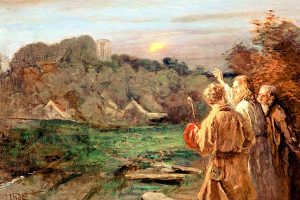Readings (Year B)
Acts 9:26–31
Psalm 22:26–27, 28, 30, 31–32
1 John 3:18–24
John 15:1-8
Reflection: Constant conversion
In today’s first reading, we hear that when Saul “arrived in Jerusalem he tried to join the disciples, but they were all afraid of him, not believing that he was a disciple” (Acts 9:26). We know Paul (formerly Saul) went on to become one of the greatest of the apostles, but at this moment in his ministry, the other disciples did not trust him.
Many of us have had experiences similar to Paul’s. Our lives are ones of constant conversion. For example, I am a revert to the Catholic faith. During my early twenties, I stopped attending Mass and seriously questioned some of the church’s teachings. While I certainly did not kill Christians as Saul did to my namesake, St. Stephen, I did say many things that were opposed to God and the church. Since my return to the Catholic faith and my entering seminary, I have encountered people who also knew me back then. A couple of them have questioned whether I actually believe the Catholic faith that I profess. They cannot believe that the non-practicing partygoer they knew has grown in virtue, reembraced the Catholic faith, and entered the seminary!
It hurts to not be understood, especially when it is our relationship with God that others do not understand. But as the second reading tells us, “God is greater than our hearts and knows everything” (1 John 3:20). God knows the truth of our growth in virtue. He knows the content of our hearts.
Just because we have grown in virtue and relationship with God does not mean that others know of our growth. It can take time for our family, friends, and coworkers to accept the newer more fervent Christians we have become. Our past words and actions continue to have an impact on people just as Paul’s pre-conversion persecution of Christians colored the lens through which the disciples viewed Paul upon his arrival in Jerusalem.
It is important for us to remember that others may have grown in virtue from when we first met them, too. Just as we wish our family, friends, and coworkers to see the relationship that we have with Christ today, it is only fitting that we attempt to see them as the people they are today, not the people they were when they may have hurt or offended us earlier in our lives.
God is truly the vine grower who “takes away every branch in me that does not bear fruit” and prunes every one that does “so that it bears more fruit” (John 15:2). The pruning that we undergo can be painful, but it is all for God’s glory! Paul underwent the Lord’s pruning, and God used him in many marvelous ways. If we allow God to continue to prune us and help us grow in virtue—and to see that growth in others as well—think of the many marvelous ways God can use us!
Receive our weekly liturgical reflections in your inbox! Click the button below to sign up.













Add comment